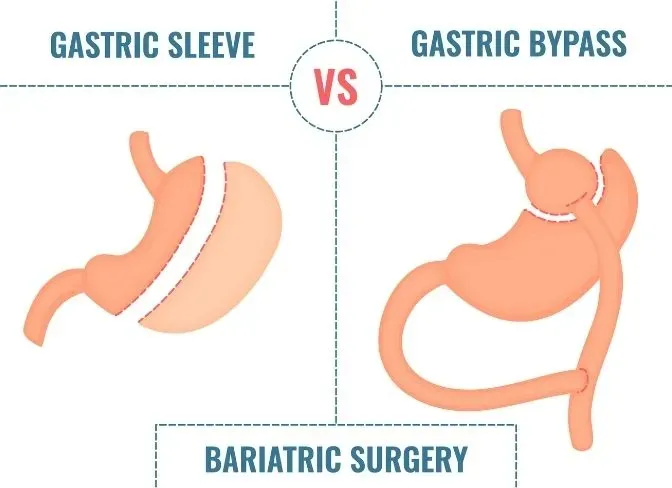After gastric surgery, including gastric sleeve and gastric bypass, gallstones are a frequent complication that might happen. The gallbladder, a tiny organ under the liver that contains bile, a fluid that facilitates digestion, is where these stones develop.
What are Gallbladder Stones?
The term “cholelithiasis” refers to the formation of solid deposits inside the gallbladder. The symptoms they can produce, which include discomfort, nausea, and vomiting, can range in size from small particles to big golf balls. Gallstones come in two different varieties: pigment and cholesterol stones. Up to 80% of instances of kidney stones are of the most frequent form, cholesterol stones.
What Causes Gallbladder Stones after Sleeve-Bypass Surgery?
Two popular forms of bariatric surgery that entail shrinking the stomach to promote weight reduction are the sleeve gastrectomy and gastric bypass. Due to a number of circumstances, these treatments may raise the risk of gallbladder stones.
First of all, fast weight reduction may cause the liver to produce more cholesterol, which may aid in gallstone production.
Second, the changed structure of the digestive system following surgery may result in a reduction in bile production, which might increase the amount of bile in the gallbladder and perhaps contribute to the development of gallstones.
Symptoms of Gallbladder Stones after Sleeve-Bypass Surgery
Following sleeve-bypass surgery, gallbladder stones can result in a number of symptoms, including as:
- Upper Right Abdominal Pain
- Nausea And Diarrhoea
- Indigestion
- Bloating
- Jaundice (A Skin And Eye Yellowing)
- Chills And A Fever
After having a sleeve bypass, you must consult a doctor right once if you suffer any of these signs.
Diagnosing Gallbladder Stones after Sleeve-Bypass Surgery
Following sleeve-bypass surgery, if your doctor believes you have gallbladder stones, they may request a number of tests to confirm the diagnosis, including:
Abdominal ultrasound: An ultrasound creates pictures of the internal organs, including the gallbladder, using high-frequency sound waves.
Blood tests: Blood tests can detect signs of infection or inflammation in the body.
HIDA scan: A radioactive dye is used in a HIDA scan to assess the gallbladder’s performance and detect if it is emptying properly.
Treating Gallbladder Stones after Sleeve-Bypass Surgery
The extent of your symptoms and the size of the stones will determine your treatment choices for gallbladder stones following sleeve-bypass surgery.
The doctor may advise pain medication until the stones pass if they are large enough to pass through the bile ducts on their own in some circumstances. Surgery could be required, though, if the stones are too big or are causing serious symptoms. The following are the most typical surgical techniques for gallbladder stones:
Laparoscopic cholecystectomy: A laparoscopic cholecystectomy is a minimally invasive procedure that involves making a few tiny incisions in the abdomen to remove the gallbladder.
Endoscopic retrograde cholangiopancreatography (ERCP): A flexible tube with a camera called an endoscope is used during an ERCP treatment to remove gallstones from bile ducts.
Preventing Gallbladder Stones after Sleeve-Bypass Surgery
Although it can be difficult to avoid gallbladder stones following sleeve-bypass surgery, there are certain lifestyle adjustments you can do to lower your risk. These consist of:
Slow and steady weight loss: Instead of losing weight too quickly, aim for a gradual weight loss of 1-2 pounds per week.
Maintain a healthy weight: Maintaining a healthy weight after reaching your weight reduction objectives is crucial to avoiding the development of gallstones.
Stay hydrated: Drinking enough water can help prevent the bile from becoming concentrated and forming gallstones.
Eat a healthy diet: Gallstones can be avoided by eating a diet high in fruits, vegetables, whole grains, and low in saturated fats.
Exercise regularly: Maintaining a healthy weight and avoiding gallstone development may both be accomplished with regular exercise.
Final Thought
Gallbladder stones are a common consequence of bariatric surgery, including gastric sleeve surgery and gastric bypass surgery. Symptoms from these stones might be difficult to treat. Medical care and lifestyle modifications can cure and prevent them.
After gastric sleeve and gastric bypass surgery, gallbladder stones must be treated quickly. Your doctor can diagnose and suggest therapy. After gastric surgery, staying hydrated, eating a nutritious diet, and exercising frequently can lower your chance of gallbladder stones and enhance your health.






Get Free Quote